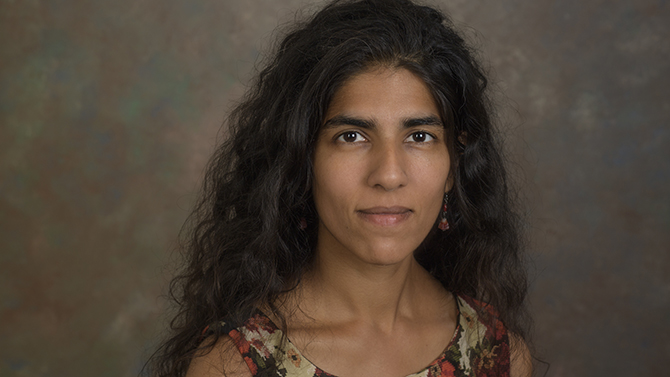


NSF Career Award
Photo by Kathy F. Atkinson October 03, 2016
Bhatnagar conducts mathematical research in problems of physics
Nayantara Bhatnagar, whose mathematical research includes a focus on probability, works on ways to solve problems that are too complex to solve analytically, that is, by hand.
The assistant professor of mathematical sciences at the University of Delaware says some of her work is motivated by problems encountered in physics that cannot be studied merely through observation.
“Physicists have realized that some systems are far too complicated to study physically, the way you can with simpler systems of one or two items,” she said.
But studying complex systems, such as the movement of molecules in a gas, she said, involves tracking millions of particles — each with its own position and velocity and all interacting with one another.
“How do you study a system like that?” Bhatnagar asked. “One way is to simulate a model of the system on a computer. You view the system as an aggregate of random events and use probability. You run many, many simulations on the computer, and if you do it enough, you can get an idea of what typical behavior is.”
The question then becomes how to define “enough.”
“That’s where the mathematics comes in,” Bhatnagar said. One focus of her work is to analyze how many times a simulation needs to be run in order to get a result that’s representative of the system being studied.
Her research has applications in biology, as in the question of how ancestral DNA can be reconstructed from the genetic information of species today, and in physics, such as the study of changes in the properties of certain materials when a parameter such as temperature is changed.
The National Science Foundation (NSF) has recognized Bhatnagar’s research with a five-year Faculty Early Career Development Award, beginning this July.
One of the most prestigious grants available to young scientists, the award is designed to support recipients who “exemplify the role of teacher-scholars through outstanding research, excellent education and the integration of education and research within the context of the mission of their organizations," according to the NSF.
Bhatnagar’s project supported by the award focuses on phase transitions in mathematical models.
Examples of phase transitions, she said, include water turning into ice at its freezing point or the magnetization of iron. At the exact transition point, the properties of the system, such as its volume or heat capacity, may change.
The NSF Career Award also includes provisions for the recipient to engage in activities with a broader impact beyond the research itself. In Bhatnagar’s case, she wants to focus on support for women in STEM (science, technology, engineering and mathematics) fields, with a special emphasis on math.
At UD and nationally, she said, women are significantly less likely than men to enter doctoral programs in mathematical sciences and are more likely to leave the program before completing it. Other doctoral programs, including those in statistics, have a better balance of male and female students, she said.
She is working with UD’s chapter of the Association for Women in Mathematics to organize such activities as trips to professional conferences, networking events and educational outreach to make sure that women students know the resources that are available to them in the mathematics department and throughout the University.
Bhatnagar also hopes to involve more undergraduates in research and to work with colleagues in the department to reinstate an enrichment program known as “math circle” for middle school and high school students interested in the subject.
In addition to her work with probability, involving random processes, Bhatnagar also focuses on the area of math known as combinatorics, or what she calls “counting problems.” In particular, she explores mixing times of Markov chains, random walks, random permutations and Gibbs measures on trees and random graphs.
In 2014, she was among the year’s 126 recipients of a highly competitive Sloan Research Fellowship, given to “early-career scientists and scholars whose achievements and potential identify them as rising stars,” according to the nonprofit Alfred P. Sloan Foundation.
Also in 2014, she participated in the Simons Program on Evolutionary Biology and the Theory of Computing at the Simons Institute at the University of California at Berkeley. The institute offers a rotating series of programs, usually a semester long, that bring together leading researchers in various fields to collaborate.
As an undergraduate, Bhatnagar studied electrical engineering and then earned her doctoral degree in algorithms, combinatorics and optimization at the Georgia Institute of Technology. Before joining the UD faculty in 2012, she taught at Berkeley and was a postdoctoral fellow in the Department of Computer Science and Engineering at Hebrew University of Jerusalem.
Contact Us
Have a UDaily story idea?
Contact us at ocm@udel.edu
Members of the press
Contact us at 302-831-NEWS or visit the Media Relations website

